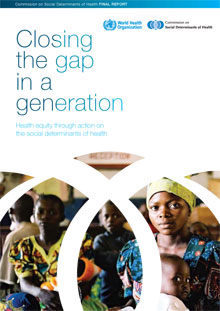By Jalil Safaei
The discourse on health equity and social determinants of health received international attention when the World Health Organizations’ (WHO) released the final report by its Commission on Social Determinants of Health in 2008 with the bold warning in its opening remarks that “Social injustice kills people on a grand scale.” (WHO Commission on Social Determinants of Health Final Report, Executive Summary).
The Report had three overarching recommendations:
- Improve daily living conditions;
- Tackle the inequitable distribution of power, money, and resources; and
- Measure and understand the problem and assess the impact of action.
The Report called on various governments, civil society organizations and other health equity advocates to take action on those recommendations and lead others in that direction. Unfortunately, the international attention around health inequity seems to have subsided and the progress, if any, on reducing global health inequities is yet to be seen. And that is no wonder. Recommendations that are not enforceable are just recommendations.
In recognition of this lack of commitment on the part of governments around the world for taking measurable action on reducing social and health inequities, a number of scholars led by Lawrence Gostin at the Georgetown University have initiated an international campaign asking WHO to adopt a Framework Convention on Global Health (FCGH) in hopes to prepare the ground for a Global Treaty on Health Equity. As ambitious as it is, the campaign recognizes the fact that without a global commitment by signing up to an international treaty, effective action on reducing social and inequities will not be forthcoming.
The Campaign is seizing the opportunity of the upcoming planning for the post-2015 Millennium Development Goals by the United Nations and tries to encourage the WHO to adopt the Framework Convention. Gostin and colleagues explain “Guided by principles underlying the right to health and mutual responsibility, a framework convention would universally ensure three conditions that are essential for a healthy life: a well-functioning health system providing quality health care; a full range of public health services, such as nutritious food, clean water, and a healthy environment; and broader economic and social conditions conducive to good health, such as employment, housing, income support and gender equality. (Gostin et al, Perspectives, Bulletin of WHO, 2013, p. 790).
The Campaign recognizes the tremendous challenges posed by the private interests and major governments in the way of ratifying such a treaty and later compliance with its terms if adopted. As such it appeals to the social movements, civil society and rights advocates to pressure their governments in the direction of committing to an internationally binding treaty.
The campaign for FCGH is supported by the Joint Action and Learning Initiative on Global Responsibilities for Health (JALI) – a global network of civil society and academics – which is inviting interested individuals and organizations to sign up their Manifesto available at http://www.jalihealth.org/documents/manifesto.pdf.
 This global campaign coincides very well with the mission and strategic priorities of the PHABC and is worth supporting by our members and friends.
This global campaign coincides very well with the mission and strategic priorities of the PHABC and is worth supporting by our members and friends.
Jalil Safaei, University of Northern British Columbia
& PHABC Board Member

